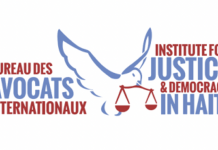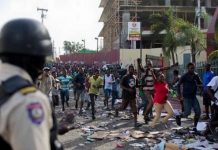Haïti Progrès, March 10, 1999
The head of the US police training mission in Haiti says she was forced out of her job last month because she opposed CIA infiltration of her program. The stunning revelation in the Washington D.C.-based weekly newspaper Legal Times comes amid growing controversy surrounding the International Criminal Investigative Training Assistance Program (ICITAP), the US Justice Department program that designed, trained, financed, and recruited cadets for the much criticized Haitian National Police (PNH). It also comes amid international outcry over the CIA’s relationship with ostensibly “neutral” organizations, like the UN Special Commission (UNSCOM) weapons inspectors in Iraq.
The latest charges against the CIA comes from no less than Jan Stromsem, the former head of ICITAP who over the last four years oversaw the US/UN’s $100 million, 5-year Haitian program. According to Legal Times, Stromsem has filed an official complaint with a US Justice Department watchdog group charging that she was ousted from her job as ICITAP director because she tried to block her staffers from engaging in intelligence activities.
“It is manifestly evident that any connection between representatives of ICITAP and any internal intelligence gathering organization would be detrimental to our mission, and would be an especially sensitive issue with many countries with which we expect to be dealing in the future,” Stromsem wrote in a 1995 memo obtained by Legal Times. The memo was written shortly after a scandal erupted over CIA recruitment efforts of PNH cadets at their training facility on the US military base Fort Leonard Wood in Missouri.
But Stromsem was blocked in her alleged efforts to wall off ICITAP from the CIA. Her boss at the US Justice Department insisted on leaving ICITAP resources at the disposal of US intelligence agencies, presumably including the CIA, the National Security Agency (NSA), and the Defense Intelligence Agency (DIA). And because of that, Stromsem charges in an official complaint with the Justice Department’s Equal Employment Opportunity office, she was hounded from her job, denied a raise, and bad-mouthed to potential employers.
Echoing long-standing reports, Legal Times said that ICITAP staffers, contractors, and trainees have affirmed that US intelligence agents tried to recruit them. One former US police trainer said that cadets would complain to him that they were being recruited on evenings and weekends. Intelligence recruiting was “not good for those cadets, not good for Haiti, and not good for the program,” the police trainer told Legal Times. “We were to make civilian police out of them, not spies.”
According to former Haitian government officials, the CIA has trained senior officers in the new PNH and recruited a number of leading police officials, particularly those in the so-called specialized units like CIMO, SWAT, and presidential security. Other US intelligence agencies, including the DIA and the NSA, are also reportedly active in Haiti. Moreover, trainers say that Canadian and French intelligence have also infiltrated the PNH. Many of the trainees are so-called sleepers, recruited and “tagged” today for use sometime in the future, sources say.
While the allegations are not a surprise to many observers, the high-level attack from Stromsem is sensational. Not only was she a key figure in the Haiti operation, Stromsem also managed the explosive worldwide growth of ICITAP police training missions in the late 1990s. She occupied what was clearly emerging as a crucial foreign policy position in Washington. In the post-cold war period, ICITAP underwent a massive expansion from running limited police training missions to creating entirely new forces in post-invasion Panama and post-peace-deal El Salvador. ICITAP opened its first field office in Panama in 1990 and by 1997 had seven such offices in Panama, El Salvador, Bolivia, Colombia, Haiti, Guatemala and Honduras. Its largest project to date has been Haiti, where ICITAP employed and/or contracted some 300 people including advisers, instructors, interpreters and support staff. In 1997 alone, ICITAP, with a budget of $24 million, ran programs in Liberia, Barbados, Belize, Bolivia, Brazil, Colombia, Costa Rica, Dominican Republic, Guatemala, Guyana, Honduras, Panama, El Salvador, Nicaragua, Kazakhstan, Kyrgyzstan, Ukraine, Uzbekistan, Albania, South Africa, Bosnia, Lebanon, and Haiti.
But ICITAP has come under heavy criticism both internally and externally. Charges of corruption, fraud, mismanagement, political patronage, and incompetence have dogged the program. The accusations come largely from former ICITAP employees. Now the US Justice Department’s Office of the Inspector General has launched an in-depth investigation of ICITAP and is slated to come out with a scathing report later this year.
The revelation of CIA infiltration of ICITAP comes on the heels of renewed confirmations of CIA incursions into other supposedly impartial agencies, such as the recently withdrawn teams of UN weapons inspectors in Iraq. Since early 1998, the Iraqi government had protested that UNSCOM inspection teams were studded with CIA agents, an accusation which the U.S. government denied. Former UN arms inspector Scott Ritter, who is releasing a book this month, has also made no secret of his CIA and Israeli intelligence collaboration. Only following the US resumption of an on-going bombing war against Iraq in December and the withdrawal of the teams did the US government admit that the UNSCOM inspectors were thoroughly infiltrated by and working with the CIA, DIA, and NSA.
ICITAP’s Legacy
While on the subject of ICITAP, it might be worthwhile to review the result of its work in Haiti over the past 5 years, namely the Haitian National Police (PNH).
Most Haitians will tell you that the country has never been more “insecure,” meaning beset by terror and violence from marauding criminal bands. Despite an occasional arrest, the PNH has proven largely incapable of preventing or solving Haiti’s increasing number of murders and robberies.
Meanwhile, the heavily-armed anti-riot units of the PNH — the CIMO, UDMO, SWAT team — have been more than proficient in their brutal crackdowns on generally peaceful demonstrations of students, peasants, and slum-dwellers.
The result is a deep and generalized disenchantment with the PNH for both its shortcomings and excesses. But much of the problem stems from the training and composition of the force, which has been overseen by the US government. “A multiagency US group selected each recruit and determined the design, training and financing of the 6,500-strong [PNH],” wrote journalist Dan Coughlin in a long article on Haiti’s continuing foreign military occupation in The Nation of Mar. 1. “More than 50 percent of the top police commissioners are recycled Haitian Army personnel, according to US and Haitian officials. United States trainers placed soldiers they considered reliable in a number of key units and systematically purged a group of reformist army officers who had refused to support the 1991 coup and joined President Aristide in exile.“
“The results have been disastrous,” the article continues. “‘Members of this US-trained force have committed serious abuses, including torture and summary executions,’ said a 1997 report by Human Rights Watch and the National Coalition for Haitian Rights.“
These findings were reiterated by none other than the U.S. State Department in its “Haiti Country Report on Human Rights Practices for 1998,” released Feb. 26. The report claims that the PNH “maintained political neutrality,” an assertion many popular organizations would contest, and “played a crucial role in preserving internal calm,” always an important consideration for Washington’s strategists, at least those who are not in the CIA.
But the State Department authors have to admit that “the HNP still grappled with problems of corruption and human rights abusers within its ranks. Allegations of corruption, incompetence, and narcotics trafficking at all levels of the force negatively affected morale.“
The report goes on to detail the sorry record of the PNH, although trying to cast it in the best light. For example, extrajudicial killings, the authors chirped, were “significantly lower than in previous years,” down to 31 in 1998 from 53 in 1997 and 59 in 1996, and “generally were not political in character,” even though they resulted from “excessive use of force and a lack of professionalism on the part of the police.“
Again, such aberrations stem from the way that ICITAP trains a corps like the PNH. Already back in 1996, a Canadian trainer complained that the U.S. was building a “military-style force” too ready “to pull their guns” as opposed to a “community-based” force (see Haïti Progrès Vol. 13 No. 48 2/21/96).
This assessment has been borne out by time and corroborated in other countries where the US meddles, usually under the guise of fighting the “war on drugs.” “When Washington does recruit police, it provides them with heavy arms and with training in combat tactics that are inappropriate for the role that police should play in a civilian society, thereby continuing to fuel human rights abuses,” noted Peter Zirnite in the Sep. 1998 edition of “Foreign Policy In Focus,” published by the Interhemispheric Resource Center and the Institute for Policy Studies. “During the 1970s, Congress halted police aid programs because of widespread human rights abuses by U.S. trained police in Latin America, but in the 1980s these programs resumed in Central America and have since spread to many other countries.“
Perhaps one should be happy there is some civilian supervision of ICITAP, since there isn’t any for several other military training programs such as “special operations forces Joint Combine Exchange Training (JCET) exercises, which involve Army Green Berets, Navy SEALS, and other special operations forces,” Zirnite notes. “The U.S Southern Command plans to conduct nearly 200 of these specialized training exercises this year, with troops being deployed to all 19 Latin American countries and nine in the Caribbean, according to the Washington Post.“
One final observation by Zirnite seems particularly relevant in the case of Haiti. “U.S troops work side by side with accused human rights violators throughout the region, not just in Colombia. As Colombian sociologist Ricardo Vargas Meza, who has warned about the growing risk of ‘a dirty war’ in his country, notes, ‘Washington lights one candle for God and another one for the devil.’“





